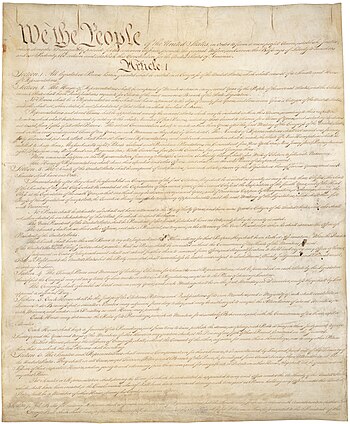United States Constitution

The United States Constitution is the supreme law of the United States of America. The Constitution, originally comprising seven articles, delineates the national frame of government. Its first three articles entrench the doctrine of the separation of powers, whereby the federal government is divided into three branches: the legislative, consisting of the bicameral Congress; the executive, consisting of the President; and the judicial, consisting of the Supreme Court and other federal courts. Articles Four, Five and Six entrench concepts of federalism, describing the rights and responsibilities of state governments and of the states in relationship to the federal government. Article Seven establishes the procedure subsequently used by the thirteen States to ratify it.
Since the Constitution came into force in 1789, it has been amended twenty-seven times. In general, the first ten amendments, known collectively as the Bill of Rights, offer specific protections of individual liberty and justice and place restrictions on the powers of government. The majority of the seventeen later amendments expand individual civil rights protections. Others address issues related to federal authority or modify government processes and procedures. Amendments to the United States Constitution, unlike ones made to many constitutions world-wide, are appended to the end of the document. At seven articles and twenty-seven amendments, it is the shortest written constitution in force. All five pages of the original U.S. Constitution are written on parchment.
The Constitution is interpreted, supplemented, and implemented by a large body of constitutional law. The Constitution of the United States is the first constitution of its kind, adopted by the people’s representatives for an expansive nation; and it has influenced the constitutions of other nations.
- Cincinnatus: The document was intended to encourage this form of political leader.
- Karma Houdini: Intended to avert this at every level. Even the President is not above the law, and while in theory the President could pardon themselves of any crimes to get out of jail free, this would be an explicit admission of guilt that would deny them any further ability to serve at any role in the government until death and would force them to give up any money or prestige they were entitled due to their position.
- Loophole Abuse: When the question of slavery came up, no one wanted to give it legal sanction per se, since it would piss off half the parties working on the document, but no one wanted to utterly ignore it, which would piss off the other half. The loophole used to please both sides was to subsume slaves under the "All Other Persons" category, which did the same thing but avoided the issue of actually mentioning slavery by name.
- Corporate personhood was born of this trope. The 14th amendment protects the legal rights of all persons, and was intended to augment the abolishment of slavery in protecting the freed blacks. However, it unintentionally provided an official shield for corporations, who are by law considered "persons" for legal reasons.
- Once More, with Clarity; Huge sections of the Constitution are lifted from the original articles, only with better defined limits on state and federal power.
- Perpetual Beta: By design. While intended to avert the failure the Articles of Confederation turned out to be, many aspects of the Constitution were left open ended so they could be amended as political circumstance dictated, and in theory, the whole document can be amended from the ground up with the consent of Congress.
- Surprisingly Improved Sequel: To the Articles of Confederation, which it is a legal continuance of.